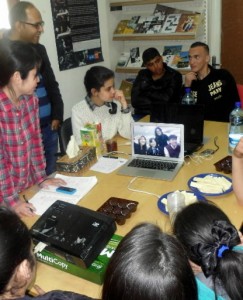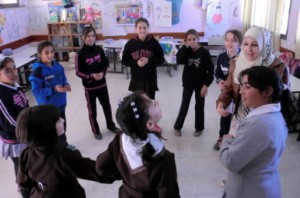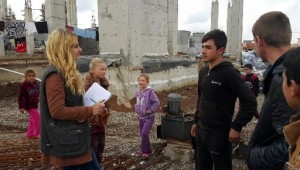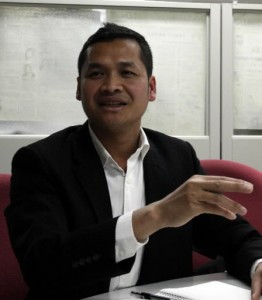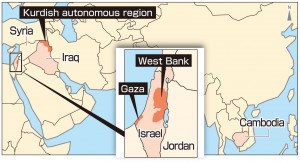Peace Seeds: Teens in Hiroshima Sow Seeds of Peace (Part 6)
Apr. 13, 2015
Part 6: Children in conflict areas struggle to live normal, peaceful lives
Conflict continues between those in power and those seeking change, or between different religions or ethnic groups. Not a single day passes without conflict taking place somewhere in the world. Children of the same generation as us, the junior writers, are suffering as a result.
Because of these conflicts, children are displaced from their homes, they’re unable to attend school, or they have no freedom to move about without fear. They are in danger of being unjustly arrested or even killed. They cannot lead normal lives, the sort of lives those of us in Japan take for granted.
The junior writers of the Chugoku Shimbun interviewed children living in Palestine via video chat over the Internet and conducted a survey of Iraqi children who fled attacks by the radical Islamist group “Islamic State.” We also interviewed a man who was a child soldier during the civil war in Cambodia. We should not be indifferent to the events taking place in distant parts of the world.
Palestine still under occupation
After World War II, the people who had been living in Palestine became displaced when the Jewish people founded the state of Israel. In 1993, a peace agreement was reached between Palestine and Israel.
However, the details of this agreement were not resolved, and though the Palestinian people were supposed to have autonomy, today Palestine remains under the occupation of Israel.
According to Sae Imamura, 29, former head of the Palestine office of Peacebuilders, a non-profit organization (NPO) based in Hiroshima, there is no gunfire now in the West Bank. Children can go to school, and food is available. In some respects, their lives don’t seem all that different from children in Japan.
However, 200 children are arrested annually for “throwing stones at Israeli soldiers.” Walls and checkpoints limit their freedom of movement, and sometimes people are forced to tear down their own homes.
Air raids in Gaza put the residents’ lives in danger, but people living there are unable to move to the West Bank or other safer areas. (Hiromi Ueoka, 14)
Arrests of children are not unusual
The junior writers interviewed, via video chat, 15 children between the ages of 10 and 16 who live in the West Bank in Palestine.
Many children in the West Bank live in a state of perpetual fear and anxiety. Mariam Al Brabrawi, 15, said it isn’t unusual for children to be arrested and jailed. Sara Madya, 11, said tear gas is used. According to Ayham Rsheed, 15, a checkpoint was set up without prior notice at a bridge on the day we interviewed him. On his way to the interview, he was stopped there for a long while without a good reason.
They said that current conditions in the West Bank are not peaceful and they believe that having freedom is a prerequisite for peace. They hope that Palestine will become an independent nation and be recognized by the international community.
Though they live in harsh conditions, Palestinian children have their pleasures and dreams, just like children living in Japan. Hussein Karaja, 16, enjoys playing soccer and riding his bicycle. Other children like reading books and using Facebook. One girl said she wants to become an actress one day.
There are things we can do in Japan to help change this situation. They asked us not to buy things made by Israelis in settlements that were built in violation of international law. (Arata Kono, 17, and Shino Taniguchi, 16)
Helping teachers support their students
Since 2012, Peacebuilders has been lending support to education in the West Bank through the use of drama and games. In workshops, the participants take part in role plays, enabling them to look at things from different points of view and speak in a way that helps others understand their feelings. This is useful for dealing with stress.
The participants of the workshops are teachers. They can bring what they’ve learned in the workshops back to their schools and try these ideas with their students. So far 227 teachers have taken part in workshops run by the NPO.
Children used to think their teachers were very strict, but they have begun to feel closer to their teachers and open up to them. This helps the children strengthen their efforts and control their feelings. Understanding the child’s point of view also enables teachers to communicate more easily with their students.
Peacebuilders now hopes to provide similar support in Gaza. (Kyoka Yamada, 16, and Marina Misaki, 15)
Interviewees: Lama Honihen, 10, Waed Esaed, 14, Shahed Saed, 15, Deema Zaytoon, 13, Mohammad Neiroukh, 13, Afnan Taha, 11, Qasam Badawi, 12, Orouba Maher, 12, Mohammad Qassem, 14, Deena Nasar, 15, Bisam Mereb, 16.
Shadow of radical Islamist group “Islamic State”
Between June and August 2014, people who fled from attacks by the radical Islamist group “Islamic State” took refuge in the Kurdish autonomous region in northern Iraq. Their children are feeling uneasy as they face an uncertain future. With the support of Peace Winds Japan, an NPO based in Jinsekikogen, Hiroshima Prefecture, we conducted a survey on how children between the ages of 12 and 16 lead lives as refugees.
These children cannot lead what we consider “normal lives.” Their wishes include: “I want to play soccer with my friends”; “I want to draw pictures”; and “I want to play with my friends.” One of the most common responses was “I want to go to school.” But many are unable to attend school because they don’t have access to a school or enough money. Even those who go to school said they can’t go every day and they don’t have good teachers or many friends.
To these children, peace means living happily in their homeland, living in a safe place, or being able to say hello to each other. They say it is important to work together with people all over the world to realize peace. (Yumi Kimura, 18)
Support from Hiroshima for refugees
Peace Winds Japan has been supporting refugees who live in the Kurdish autonomous region in northern Iraq. Currently there are 230,000 to 240,000 refugees of Kurdish origin from Syria and about 1 million internally-displaced people mainly from southern Iraq.
Refugees from Syria fled their country after a conflict broke out between the government and anti-government forces in 2011 during the so-called Arab Spring. The number of internally-displaced people has been sharply increasing since June 2014 because of battles between the government forces and the radical Islamist group “Islamic State,” among other factors.
In cooperation with the local government and U.N. organizations, Peace Winds Japan has been active in eight Syrian refugee camps and six or seven camps for internally-displaced people. The scope of their activities covers constructing shelters, supplying oil and other goods, building schools, conducting health checkups for children, and providing glasses and hearing aids.
Kei Fukagawa, 31, a member stationed in Iraq, said, “We hope to help them live in their homeland again.” Anticipating that the number of refugees and displaced people will rise, the NPO is planning to work on improving hygiene in the environment. (Yumi Kimura, 18)
Cambodian fifth-grader sent to battlefield
Ry Saroeun, 36, runs a Cambodian restaurant in downtown Hiroshima. Mr. Ry, from Cambodia, said that his country was trapped in a civil war as far back as he can remember. “There was only war and I had no dreams, or never thought of having dreams,” he said. There was not enough food. Even schools weren’t safe, and he had to flee when artillery was fired in the direction of his school. “We could only study for 30 minutes or one hour,” said Mr. Ry.
When he was 14 or 15 years old, he was sent into battle as a child soldier. At that time the school system in Cambodia was not well organized, and he was still in fifth grade. Without any explanation, children were carried away in trucks from his school. It was an order made by the government. The students were unable to say goodbye to their families and, according to Mr. Ry, many children died.
Wars and conflicts deprive children of family members, friends, food, and time to study. Mr. Ry said that he will share his account so that no one else will have to experience what he endured. There is stability now in Cambodia and Mr. Ry hopes to build community centers there. He would also like to use his knowledge of landmines to help remove these weapons from the soil of Sudan. (Article by Kana Fukushima, 16, and Terumi Okada, 14; Photo by Kana Fukushima)
What we can do:
◆Read books and newspapers to deepen our knowledge and convey this information to family members, friends, and others close to us. Raise money.
◆Boost exchanges with children in conflict regions through via video chat or social networking and broaden each other’s views.
◆Take part in study tours organized by NPOs and learn about conditions in conflict areas.
◆Disseminate information on conflict areas through Facebook or other means. (Edited by Nana Kawaichi, 13)
Junior writers’ postscripts
When we have discussions on what to cover in our articles, we’re always interested in many different themes, making it difficult to focus on one. This time we reached a decision in our second meeting. I’ve always been interested in children who live in conflict areas, and I enjoyed listening to them directly through video chat. (Arata Kono)
After completing our interview, I realized that I’ve been to the Cambodian restaurant run by Mr. Ry Saroeun. The food was so delicious that I hope to go back. (Shino Taniguchi)
When a Palestinian child asked us about our problems, one of the junior writers answered that he’s worried about not having a girlfriend. The response from the Palestinian children showed that they didn’t think this was very funny. I thought what he said was kind of odd. But I enjoyed the interview. (Kyoka Yamada)
Nothing was easy about this article. We had a hard time deciding on the theme and continued discussing this until late in the evening. The theme we agreed on after long discussions was hard to carry out. But I feel satisfied that our efforts finally produced an article. (Marina Misaki)
With this article, my five and a half years as a junior writer have come to an end. I can say that my life has been altered through my activities as a junior writer. I’m grateful that I’ve been able to have such enriching experiences with adult reporters I admire, the junior writers who left before me, and the nice group of junior writers here now. Thank you so much. (Yumi Kimura)
It was the first time I interviewed people from another country. Before the interview I was afraid they would be difficult to approach, but they were nice and it worked out fine. (Terumi Okada)
The interview started at 6:00 p.m. and I got really hungry. I felt like eating Cambodian food prepared by Mr. Ry Saroeun. (Kana Fukushima)
I had seen children living in conflict areas only in the news and they seemed distant and far away. But after interviewing them, I feel closer to them. While preparing for the interview, I found a girl who stayed with my family before through Facebook. I’m happy to be in touch with her again. It was a great experience. (Nana Kawaichi)
What is Peace Seeds?
Peace Seeds are the seeds of smiles which can be spread around the world by thinking about peace and the preciousness of life from various viewpoints. To fill this world with flowering smiles, 44 junior writers, from the sixth grade of elementary school to the last year of high school, choose themes, gather information, and write articles.
(Originally published on March 26, 2015)

